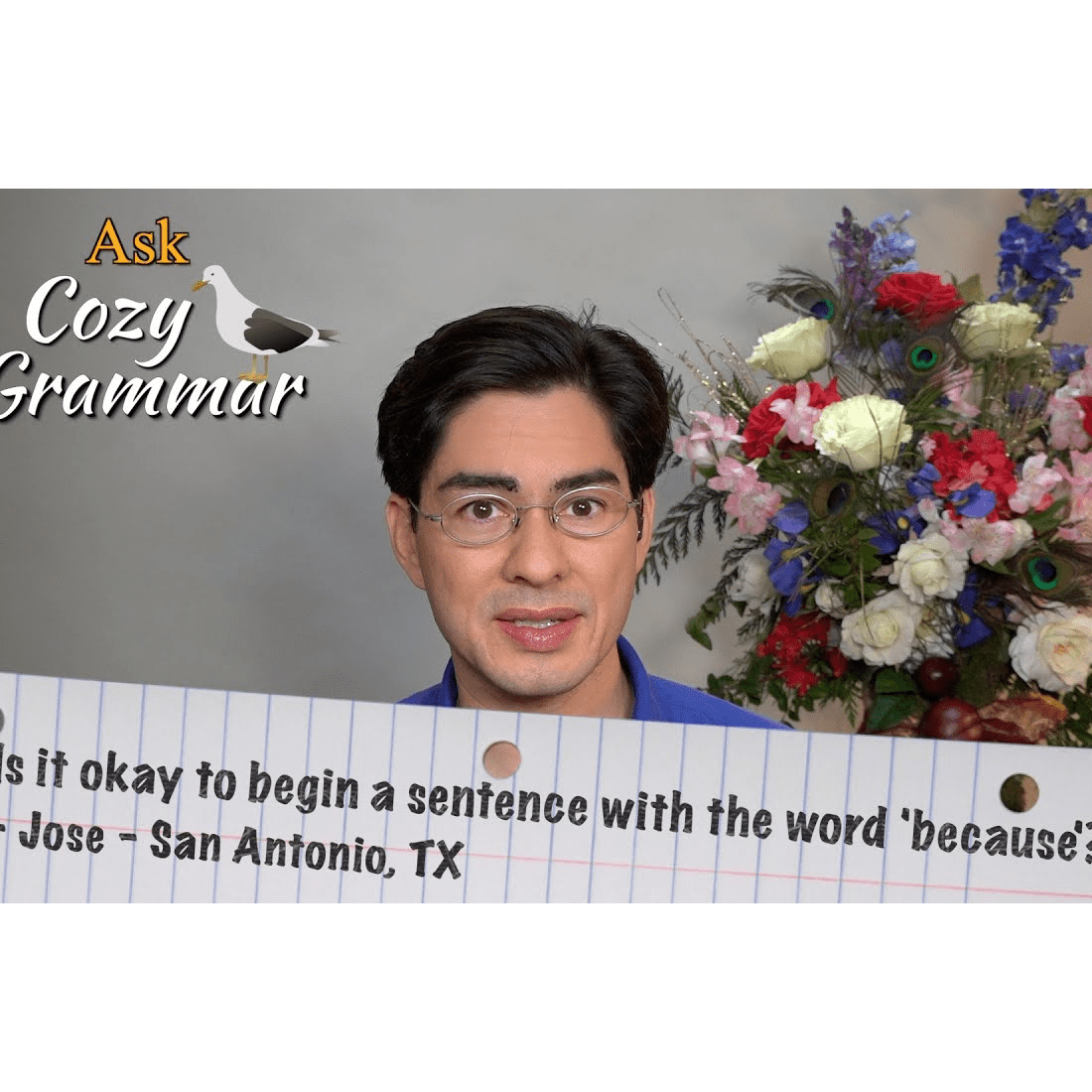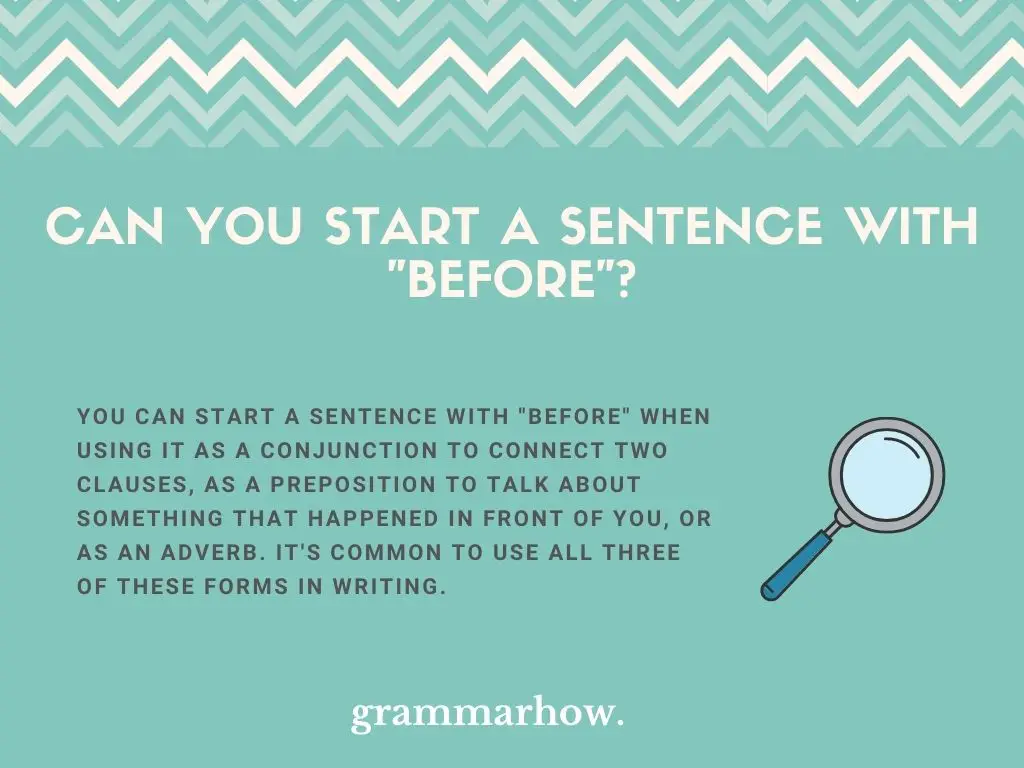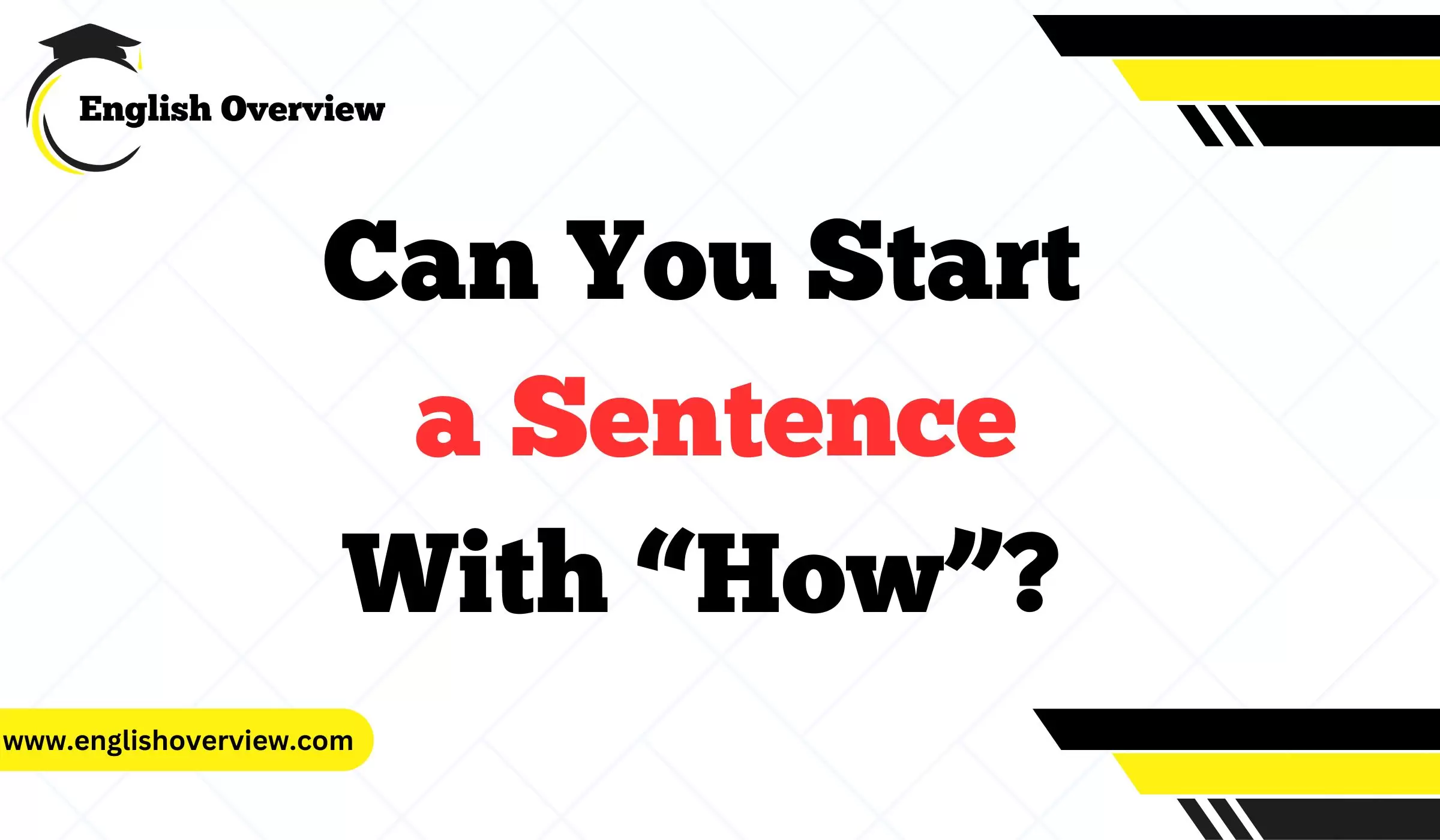Have you ever stopped writing mid-thought, a little voice in your head whispering that you absolutely cannot, under any circumstances, kick off a sentence with the word "but"? It's a common worry, and you are definitely not alone in feeling that little nudge of hesitation. Many people, you know, have been told over the years that starting a sentence with this particular word is somehow against the rules, a slip-up in proper writing, or just plain incorrect.
This idea, it seems, has been passed down through classrooms and various writing guides for quite some time, making it feel like a deeply rooted principle of good grammar. You might picture a stern teacher, ruler in hand, ready to give a gentle tap on the knuckles for such an apparent transgression. But, as a matter of fact, the truth about this so-called rule is, shall we say, a little more flexible than you might have been led to believe.
So, what's the real scoop? Is it a true grammatical misstep, or is it, perhaps, just an old piece of advice that has, you know, sort of outlived its strict application? We're going to pull back the curtain on this writing quandary and look at what makes sense when you're trying to put your thoughts down on paper, or on screen, for that matter. We'll explore when this little word can actually be a very helpful tool for your written communication.
- 60s Mod Hair
- Abuja Airport Nigeria
- Whats The Number To Call Private
- Milo Manheim Young
- Andy Cohen And Partner
Table of Contents
- What's the Big Deal About Starting Sentences With "But"?
- When Did People Start Thinking You Couldn't Begin a Sentence With "But"? - can a sentence begin with but
- So, Can You Really Start a Sentence With "But"?
- How Can Starting a Sentence With "But" Help Your Writing? - can a sentence begin with but
- What About Those Grammar Rules and "Can a Sentence Begin With But"?
- When Is It a Good Idea to Start a Sentence With "But"?
- Are There Times When You Should Think Twice About "Can a Sentence Begin With But"? - can a sentence begin with but
- What Do the Experts Say About "Can a Sentence Begin With But"?
What's the Big Deal About Starting Sentences With "But"?
For a good many folks, the idea of starting a sentence with "but" feels, well, a bit off. You see, words like "but" are often called coordinating conjunctions. Their usual job, you know, is to act like a bridge, connecting two parts of a sentence that are more or less equal in their grammatical weight. Think of it like this: "I wanted to go to the park, but it started raining." Here, "but" smoothly links the desire to go with the reason for not going. It just ties things together in a neat package.
The hesitation, then, often comes from the thought that if you pull that linking word out and put it at the very start of a new sentence, you might end up with something that feels, or even looks, like a sentence fragment. A sentence fragment is, basically, a group of words that pretends to be a full sentence but is actually missing a key piece, like the main actor doing something, or the action itself. If you take away the connection, and what's left just hangs there, not making much sense on its own, then you definitely have a little bit of work to do on your wording, you know?
Some people who are really, really keen on traditional grammar rules might even tell you that placing a conjunction like "but" at the very beginning creates a thought that's not fully formed, sort of like a broken piece of a sentence. This perspective, you see, comes from a very particular way of looking at how sentences should be built, favoring a structure where every single sentence stands completely on its own, without relying on a previous one for its full meaning. It's a style that prioritizes a kind of self-contained completeness for each unit of thought.
- Jill Wagner Movies
- Video Of Fan Falling
- Highest Iq Ever In The World
- Mexico Actor
- Happy Birthday My Love Msg
When Did People Start Thinking You Couldn't Begin a Sentence With "But"? - can a sentence begin with but
It's interesting, really, to think about where this strong feeling against starting sentences with "but" might have come from. For a while, it seems, using "but" to kick off a new sentence was, in a way, looked down upon quite a bit. This wasn't always the case, but there was a period where it just wasn't the popular choice, you know, among those who taught writing or set the standards for what was considered proper.
One reason for this, you see, might be how teachers approach teaching the building blocks of language. When students are just getting a handle on how sentences work, learning the very basics of putting words together, instructors often suggest staying away from starting with conjunctions. This is because, quite simply, starting a sentence with a word like "but" can sometimes feel a bit sudden or, you know, a little informal. It's a stylistic choice that, for someone still learning the ropes, might lead to actual sentence fragments if they aren't careful, which is something we definitely want to avoid in early writing lessons.
So, the advice to avoid starting sentences with "but" probably started as a helpful guideline for new writers, a way to ensure they understood how to construct complete and independent thoughts. It was, in some respects, a teaching tool to prevent common writing errors, rather than a strict, unbending rule for all writing, all the time. Over time, though, this advice might have been repeated so often that it turned into something that felt like a hard-and-fast rule, even for those who had moved past the beginner stages of putting words together.
So, Can You Really Start a Sentence With "But"?
Okay, so let's get right to the point: can you, as a matter of fact, start a sentence with the word "but"? The answer, simply put, is yes. It's perfectly fine to do so, especially in how we write and speak in modern English. You see, while some people might still consider it a bit of a departure from older, more formal styles, it's generally accepted, particularly when you're aiming for writing that feels natural, conversational, or when you want to express something with a bit of feeling.
The idea that you absolutely cannot begin a sentence with "but" is, you know, a bit of a myth that has stuck around for too long. It's one of those bits of advice that, honestly, gets repeated without much thought about its actual basis in how language works today. So, if you're writing something where you want to sound like a real person talking, or if you're trying to get a point across with some directness, beginning a sentence with "but" is a tool that's absolutely at your disposal.
While it might be seen by some as a "nonconformist" way of writing, that doesn't mean it's wrong. In fact, many accomplished writers and communicators use this structure regularly because it allows for a certain flow and rhythm that can make reading more enjoyable. It's about making choices that serve your message and your audience, rather than blindly following outdated directives. You can, pretty much, start a sentence with "and" or "but," and many other coordinating conjunctions, too, without any real issue.
How Can Starting a Sentence With "But" Help Your Writing? - can a sentence begin with but
Using "but" at the start of a sentence can actually make your writing feel more alive and, you know, a lot easier for someone to read. It helps to really bring out a sharp difference or show a shift in your thoughts, almost like turning a corner in a conversation. When you begin a sentence this way, you're signaling to your reader that what's coming next is going to be a contrast to what you just said, or a different direction entirely. This can make your writing much more dynamic and keep people interested.
It's a way to add emphasis, too. When you place "but" at the beginning, you're giving it a bit more weight, telling the reader, "Hey, pay attention, because here comes a twist or a counterpoint." This can be particularly useful when you want to create a strong impact or highlight a significant change in circumstances or ideas. It helps to break up longer stretches of thought and, in a way, provides a little pause that makes the subsequent statement stand out. So, it's not just about breaking a rule; it's about using a technique to get your message across more powerfully.
Because of its ability to create this kind of emphasis and clear contrast, starting a sentence with "but" is often best kept for moments when you really want to make a point. It's like a special tool in your writing kit that you pull out when you need to draw a clear line between two ideas, or when you want to surprise the reader with a different perspective. It can make your writing feel more natural, more like spoken language, which, you know, can be really appealing to a reader who wants to feel a genuine connection with the words on the page.
What About Those Grammar Rules and "Can a Sentence Begin With But"?
Let's talk a bit more about that idea of a "sentence fragment" that some folks worry about when it comes to starting with "but." A sentence fragment, to be clear, is a group of words that might look like a complete sentence at first glance, but it just can't stand on its own because it's missing a key ingredient. That ingredient is usually either the main subject, the person or thing doing the action, or the main verb, the action itself. If you're missing one of those, it's not a full sentence, you know?
When you start a sentence with a coordinating conjunction like "but," the worry is that the part that follows might be just a fragment. But, and this is a really important point, if the words that come after "but" form a complete thought, with its own subject and its own verb, then you absolutely have a perfectly good, stand-alone sentence. For example, "But the dog barked loudly." Here, "the dog" is the subject and "barked" is the verb. That's a full thought, even with "but" at the beginning.
The key, then, is not whether "but" is at the beginning, but whether the rest of the sentence is grammatically complete. If you remove the "but" and the remaining words still make a proper sentence on their own, then you're usually in the clear. So, it's less about the position of "but" and more about the overall structure of the words that follow it. This distinction, you know, is pretty much what makes the difference between a real sentence and a piece of one that just doesn't quite work on its own.
When Is It a Good Idea to Start a Sentence With "But"?
You might be wondering, then, when is the best time to actually use this particular sentence opener? Well, it's a good idea to start a sentence with "but" when the result is perfectly clear and, honestly, more effective than any other way you could phrase it. Sometimes, you know, breaking a thought into two sentences, with the second one starting with "but," just makes the flow of ideas smoother and the contrast you're trying to create much more apparent. It can add a kind of punch that a comma and "but" in the middle of a single sentence just can't quite deliver.
It's particularly effective when you're trying to emphasize a sudden change in direction or a strong opposing idea. For instance, if you've just spent a paragraph describing a beautiful, sunny day, and then you want to introduce a sudden downpour, starting the next sentence with "But" immediately signals that shift. "But the clouds gathered quickly, and rain began to fall." This creates a dramatic effect that keeps the reader engaged and makes the change in mood very clear. It's a way to really grab someone's attention and guide them through your thoughts.
You can find examples of this usage in writing that's considered, you know, quite good, both old and new. Even in respected guides like Fowler's Modern English Usage and The Elements of Style, you'll see instances where sentences begin with conjunctions. This shows that the practice isn't some new, rebellious trend, but rather a stylistic choice that has been accepted and used by skilled writers for a very long time. So, when you're aiming for impact or a clear, conversational shift, starting with "but" can be a really smart move.
Are There Times When You Should Think Twice About "Can a Sentence Begin With But"? - can a sentence begin with but
While it's perfectly fine to start sentences with "but," there are, you know, a few times when you might want to pause and think about it. One consideration is simply overuse. If every other sentence in your writing starts with "but," it can begin to sound repetitive and lose its impact. Like any good stylistic choice, it's best used sparingly, when you really want to achieve a specific effect, rather than as a default way to connect your thoughts. A little bit of variety in your sentence beginnings always makes for more interesting reading, to be honest.
Another thing to keep in mind is your audience. While many people today accept starting sentences with "but" without a second thought, you may, just possibly, come across some individuals who still mistakenly believe that doing so is an error. This might be particularly true in very formal settings, or for readers who were taught a very strict set of grammar rules and have held onto them tightly. So, you know, when you're deciding how to structure your sentences, it's always a good idea to consider who will be reading your words and what their expectations might be.
What about academic writing, then? This is a question that comes up quite often. While there's nothing inherently wrong with starting a sentence with "but" in academic papers, some professors or journals might have their own preferences for a more formal, less conversational style. In those situations, it might be wise to stick to joining clauses within a single sentence or finding other ways to express contrast, just to be on the safe side. It's less about a hard rule and more about, you know, adapting your style to the specific context and expectations of your readers.
What Do the Experts Say About "Can a Sentence Begin With But"?
Many voices in the world of language and communication have weighed in on this very topic, and their general consensus leans heavily towards acceptance. For instance, Candace Schaefer, from "In a Word," a weekly communication tip series, has pointed out that while people often say you should never start a sentence with certain words, especially "and" and "but," you can, as a matter of fact, start a sentence with either word. This goes to show that the idea of a strict prohibition is, you know, pretty much a common misunderstanding.
It's also worth noting that this isn't a new idea. Over a century ago, a rhetorician from Harvard named Adams Sherman Hill, in his 1896 work "The Principles of Rhetoric," addressed this very point. He acknowledged that sometimes people object to using "but" or "and" at the beginning of a sentence. But, he quickly followed up by stating that there is, in fact, "much good usage" for this practice. This tells us that even way back then, the idea of avoiding it was being challenged by those who understood how language truly works in practice.
In fact, if you look back through history, it has been a common practice to begin sentences with conjunctions like "and" or "but" for a very, very long time, stretching back at least as far as the 10th century. This historical perspective, you know, really puts to rest the notion that it's some
- %D0%B3%D0%B0%D0%B1%D0%B8 %D0%BA%D0%B0%D1%80%D1%82%D0%B5%D1%80
- Pray Good Night
- Whats The Number To Call Private
- What Did Rio Da Yung Og Do
- Single Black Crow Meaning



Detail Author:
- Name : Dangelo Green
- Username : furman98
- Email : jedidiah94@yahoo.com
- Birthdate : 1997-03-29
- Address : 87535 McKenzie Hollow Apt. 438 Casperport, IL 53794-4369
- Phone : +1 (458) 225-1110
- Company : Heaney, Cummings and Carroll
- Job : Coil Winders
- Bio : Exercitationem est et ut est quis. Quo et voluptates distinctio sunt aut. Magnam nostrum aliquid voluptas nam impedit consequatur quam.
Socials
twitter:
- url : https://twitter.com/bayera
- username : bayera
- bio : Nisi odio unde repellat necessitatibus natus. Mollitia ut mollitia libero reiciendis ullam laborum consequuntur. Autem dolore quis perferendis sit.
- followers : 1836
- following : 2039
facebook:
- url : https://facebook.com/allen.bayer
- username : allen.bayer
- bio : Praesentium quasi molestias quos omnis debitis.
- followers : 2386
- following : 430
instagram:
- url : https://instagram.com/allenbayer
- username : allenbayer
- bio : Quia molestiae laudantium vel. In odit eveniet nemo beatae. Quidem corrupti eum et sint.
- followers : 6884
- following : 2703
